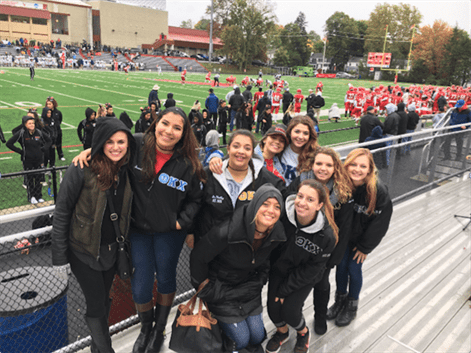
Memebers of Montclair State Greek Life attending a Red Hawk football game.
Jennifer Dalli Cardillo | The Montclarion
Montclair State University. 534 athletes. 1,300 Greeks. Over 20,000 students in total. For being a 68 percent commuter-based school, these Red Hawks are pretty active on campus. Montclair State is a Division III school for athletes. Sigma Delta Phi was the first Greek organization established on this campus in 1947 and the sisters continue to wear their letters around in 2017.
Athletes represent the University, and whether they win or lose or conduct themselves in a positive or negative way, it reflects back on Montclair State. On the other hand, Greek organizations pride themselves on “giving back” to the community, both on and off campus. If the two are both means to becoming successful based on their achievements, why are they not equally classified in the eyes of Montclair State?
It’s the first day of the fall semester of freshman year. Many new Red Hawk faces are frantically running around, trying to figure out where they belong. They happen to stumble upon a “Meet the Greeks” flyer in the Student Center and, eager to find out more, they show up to the advertised location at the projected time, only to be let down. But why? To put it simply, freshmen are not allowed to join Greek Life during their first semester at Montclair State.
Meanwhile, first semester freshmen are allowed to go out for their desired sports team. In order for them to remain a player on the team, they must maintain a 2.0 GPA, all while trying to wash, dry and fold that overflowing laundry basket sitting in their dorm room while living off ramen noodles for the next three months.
It is now their second semester; time for that freshman to come back out with the hopes of joining a Greek Organization. Although, they quickly learn they are unable to rush because they do not meet the minimum 2.6 GPA requirement, soon going up to a 2.7 in May 2017. But why? Why are these two GPA requirements so drastically different? Since athletes and Greeks work towards one common goal, shouldn’t they work toward one GPA requirement as well?
Red Hawk Accreditation for Greek organizations requires two Leadership Development & Campus Connections (LDCC) events each semester, per active member. “Make Your Greatest Weakness Your Greatest Strength” for instance is the title of an LDCC event Montclair State has to offer.
“Doing two isn’t that bad. Whether it be personal or professional, they are very important,” Theta Kappa Chi Vice President, Kira Casas said. “You are provided with opportunities to learn something outside of your organization; you never know what you might take away from them.”
“I find that people wouldn’t attend them, if they weren’t required,” Theta Kappa Chi’s President, Samantha Burns said. “There’s only so many times you can listen to a person speak to you about leadership and development skills.”
Being a player on an athletic team is all about maintaining proper sportsmanship and acquiring leadership roles. Therefore, would it be beneficial for athletes to attend at least one LDCC event a semester, in order to further strengthen their leadership skills? Students have created a stigma on college campuses all over the country that fraternity brothers and sorority sisters are only good for two things: drinking and partying. On top of maintaining a 2.6 GPA and attending two LDCC events, Greek organizations are required to have 40 percent of their members attend any sporting event on campus.
“Giving back” comes into play when each member is required to complete 10 hours of community service each semester. Even though the requirement is only ten hours, some members enjoy going above and beyond. Alyssa Vaughn, a sister of Theta Kappa Chi, completed 25 community service hours in the spring of 2016.
“Greeks are all about giving back,” Casas said. “Ten hours may sound like a lot, but it’s a piece of cake.”
Fulfilling a community service requirement based upon the organization’s philanthropy is another option. Philanthropies are what an organization is built on and they are not required for Red Hawk Accreditation or from the Office of Greek Life. Along with community service hours, it is the organization’s job to raise $15 per person, towards their philanthropy. For example, Theta Kappa Chi holds an event every year, called “Theta’s Sweetheart.” During the spring semester of 2016, the sorority outshined the $15 requirement and managed to raise $2,133 for the Ashley Lauren Foundation, a non-profit organization that depends on the support of the community in order to help those battling pediatric cancer.
Athletes are not required to complete community service hours, but some do what they can to help the community.
“We do a lot to give back to the community,” sophomore baseball player Connor Kelly said. “We run children’s camps in the fall for little kids interested in being a part of a college-level team for a day, as well as high school athletes and other Red Hawks.”
With Kelly recently becoming a brother of Tau Phi Beta, he realizes the reputation Greek Life has on campus and, as a second-year outfielder for the Red Hawks, he wants to bring light to the Greek community on behalf of the baseball team.
“I’m not ready to shut the door on my baseball career, just yet,” he said. “But joining a fraternity will allow me to grow and promote a positive image for the university.”


